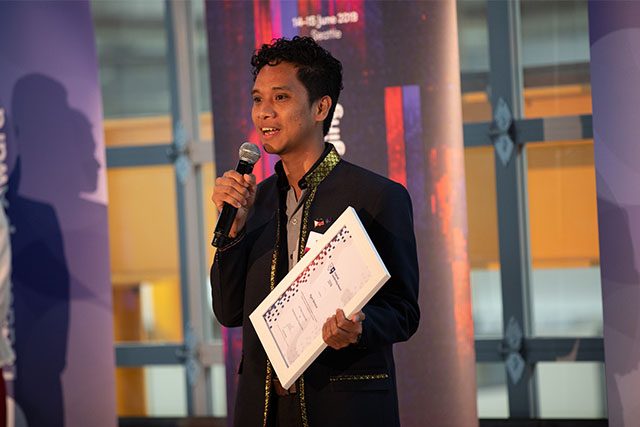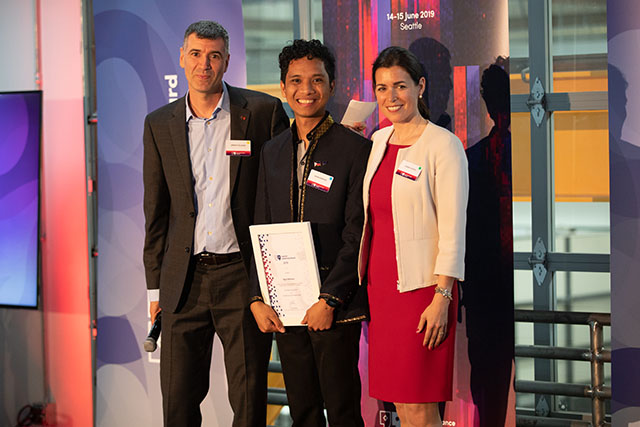
A Filipino was recognized in the international scene for his initiative to help persons with disability and those afflicted with medical conditions to find opportunities that can empower and elevate them as individuals.
Ryan Gersava received the 2019 Inspired Leadership Award given by The Performance Theatre. The award “recognizes emerging leaders driving positive change on a global scale.”
The organization annually commends up-and-coming, purpose-driven leaders who have developed new entrepreneurial approaches in creating positive change among their respective communities with potential for global impact.
Previous recipients of the award include business and philanthropic leaders such as Virgin Group founder Sir Richard Branson and Bill & Melinda Gates Foundation founder Melinda Gates.
Former Unilever CEO Paul Polman, Verizon Communications CEO Hans Vestberg and former Mexican President Felipe Calderón also received the award.
Gersava, who is a Davao-based social entrepreneur, bagged the award along with three other entrepreneurs from the United States, Kenya and India last June 2019.
The young Filipino entrepreneur founded Virtualahan, a social enterprise that enables persons with disability and individuals with serious medical conditions to work as home-based professionals.
It provides them with intensive digital skills, lifetime mentorship and different job opportunities so they could be empowered as individuals in both local and international communities.
It was this precise goal that prompted the international organization to award Gersava and recognize him for his efforts in breaking employment and economic barriers when it comes to persons with disability.
“It is an enormous source of inspiration to see the dedication of the awardees to their work and the concrete impacts they are achieving,” The Performance Theater founder Osvald Bjelland said.
Transforming the labor system for PWDs
Gersava created Virtualahan in 2015 after he personally experienced being denied employment opportunities for being diagnosed with Hepatitis B.
The experience inspired the medical technology graduate to make a tech social enterprise where people like him can still contribute their skills and earn money despite their conditions.

Persons with disabilities, individuals diagnosed with serious medical conditions and people from marginalized sectors such as out-of-school youth are given the chance to engage in the workforce.
They would undergo a six-week online training course where they are taught various skills in digital marketing, search engine optimization, administrative support and much more.
Graduates would then be given employment opportunities to any of Virtualahan’s clients, employment partners and companies in need of outsourcing support from around the world.
“Our mission is to build the future of work where no one is left behind by transforming the labor system for PWDs to thrive using the equalizing power of technology and a new approach to educating PWDs,” Gersava shared.
“Our impact formula transforms our scholars from being dependent on their families to becoming breadwinners and leaders in their community,” he added.
The Philippines is still far from being PWD-friendly
The Philippines is not yet a PWD-friendly society, according to an annual human rights report released by the US Department of State on March 2019.
The report stated that PWDs still continue to face “discrimination in finding employment” in 2018, citing data from the Department of Labor and Employment where only 10% of employable persons with disabilities were able to find work.
The report acknowledged that PWDs in the country have the right to be employed with considerations for their particular needs under the Magna Carta for Disabled Persons or Republic Act 7277.
However, the Philippine government has “limited means” of assisting PWDs in terms of finding employment and filing lawsuits in cases of employment-related discrimination.
“The government did not effectively monitor and enforce laws prohibiting employment discrimination based on disability, and the National Council for Disability Affairs and the labor department did not monitor the regulation regarding the employment of persons with disabilities effectively,” the report reads.
“The government had limited means to assist persons with disabilities in finding employment, and the cost of filing a lawsuit and lack of effective administrative means of redress limited the recourse of such persons when prospective employers violated their rights,” it continued.